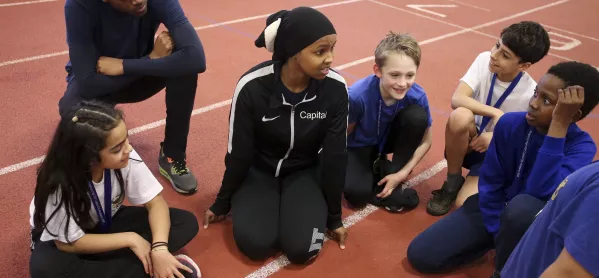- Home
- Teaching & Learning
- General
- How PE teachers can help to tackle racism in sport
How PE teachers can help to tackle racism in sport

It’s time to address the elephant in the room: racism in sport is a problem. It’s always been an issue, but the scandal at Yorkshire County Cricket Club has brought the discussion back to the fore.
PE teachers and schools have a critical role to play here: and all should be teaching racial justice and equity as part of their core purpose. Teachers are in a unique position to lead a movement forward which recognises, celebrates and validates all young people so that when they show up for sport, they feel embraced, rather than shunned.
This isn’t easy. There are clear barriers when it comes to inclusive sport and participation, and teachers need to be aware of the impact race has on activities in PE.
More:
In swimming, 80 per cent of black children in England do not swim, and only 2 per cent of regular swimmers are black. Cultural barriers can stop children from accessing sport, so PE leads must be creative to ensure activities like swimming are seen as a necessity by parents and students. School is the leveller, and PE can play a vital role.
So how can teachers do this, exactly? And how can they keep antiracism in mind when planning both curricular or extracurricular activities? These three words may help: empowerment, encouragement and enrichment.
Empowerment
Utilise leadership training to build skills and confidence in pupils. PE teachers should encourage pupils to be brave in calling out behaviour and be quick to respond to racial microaggressions. Review what you offer on the curriculum, is it reflective of what all young people want? Think about readings, videos, resources and sports on offer and how they’re informed by diverse knowledge and experiences.
Encouragement
Sport can be a safe place for providing encouragement for pupils to focus on themselves and their values, and explore complex societal challenges such as inequity, race and racism, gender and climate change. Let pupils make mistakes and reflect in PE, otherwise, they won’t strive outside of their comfort zones. Know the pupils in front of you, listen and respond to them, especially when they grapple with choices that can either lead to conflict or compliance with the powers that be.
PE teachers are powerful confidantes for pupils. They can be the trusted support in a pupil’s corner.
Enrichment
PE teachers need to recognise their own bias, not just as a teacher but also as a person. Who do you choose in your lesson to perform a skill or demonstrate to others? Who gets in trouble the most? Is that truly a reflection of the student or is there a risk you’re perceiving a characteristic of their race or background?
Teachers can seek opportunities to learn through peers and form partnerships with other schools. When we have this knowledge, we’re better equipped to teach our learners. We know ensuring a diverse and inclusive environment begins with the curriculum, but we must educate ourselves to do this effectively. Look around the sports hall or classroom and ask yourself: do learners see themselves? How do we set the tone in our facilities and space? Is it safe and secure?
We should nurture pupils’ thinking by signposting to how others have developed skillsets to overcome challenges particular to facing racism: rower Arshay Cooper is a great example. It’s important to cultivate a mindset of resilience and curiosity.
Rather than pupils believing they will never fit in, teach them the status quo must be challenged and society needs to accommodate who they are. One book that talks about this well is Michael Holding’s Why We Kneel, How We Rise.
Provide space in PE for social mixing and look at sporting examples. Discuss issues like how racism isn’t always based on skin colour. Use moments in time like Black History Month, religious festivals and big sports events. This will help prepare pupils to contribute positively to the world around them.
Vernon Samuels is an olympian and mentor and Vicci Wells is the head of sport and SEND inclusion at the Youth Sport Trust
For more information on the Youth Sport Trust and how the charity uses sport to equip educators and empower young people, visit www.youthsporttrust.org
You need a Tes subscription to read this article
Subscribe now to read this article and get other subscriber-only content:
- Unlimited access to all Tes magazine content
- Exclusive subscriber-only stories
- Award-winning email newsletters
Already a subscriber? Log in
You need a subscription to read this article
Subscribe now to read this article and get other subscriber-only content, including:
- Unlimited access to all Tes magazine content
- Exclusive subscriber-only stories
- Award-winning email newsletters
topics in this article



